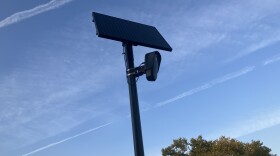In her opening statement to the jury, prosecutor Anna Gotfryd said Hankison's actions during the deadly raid were “unbelievably dangerous” and made a fellow officer “sick to his stomach.” Prosecutors allege Hankison fired blindly through a covered window and patio door of Taylor’s apartment, with some of those bullets landing in a neighboring unit occupied by a pregnant woman, her boyfriend and her five-year-old son. Hankison fired his gun after Taylor’s boyfriend, Kenneth Walker, shot once at officers attempting to break down the front door. Walker later said he thought they were intruders.
“Without being able to see anything or anyone inside, the defendant shot not once, not twice, but 10 times,” Gotfryd told jurors.
Gotfryd said after shooting stopped, other officers observed Hankison “bouncing up and down, pointing at his chest,” seemingly uncaring about the people whose lives he just endangered.
In order to prove Hankison guilty, prosecutors will have to show that he “willfully and knowingly” violated the rights of Taylor, her boyfriend and her neighbors through an inappropriate use of deadly force.
They’re arguing that he fired blindly, without “target identification and isolation,” and that he fired out of anger or revenge. Doing so would clearly go against all training and policy around use of force, Gotfryd said.
Following the prosecutor's opening statement, defense attorney Jack Boyd quickly tried to undermine the federal government’s narrative. His first words to the jury were:
“That was pretty dramatic. And if that actually happened, that would be pretty terrible.”
Boyd tried to distance Hankison from debate over whether officers should have been at Taylor’s apartment in the first place, telling jurors he had no role in the preparation of the search warrant or planning of the raid. He said Hankison didn’t have a layout of the apartment building ahead of time, so he couldn’t have known about the shared wall between Taylor and her neighbors.
“How could he willfully and knowingly violate the rights of someone he didn’t even know was there?” Boyd argued.
While prosecutors said Hankison attended numerous use-of-force trainings throughout his law enforcement career that would have taught him never to fire blindly, Boyd referred to those trainings as “slideshow presentations” and “shooting at paper targets.”
Hankison’s defense attorneys also dismissed the prosecutor's claims that he fired blindly, saying he perceived “right where the guy” was when he fired. Hankison testified during his state court trial that he could see a muzzle flash when Walker shot at police. Boyd ended his opening statement by telling jurors everything Hankison did that night was “to save his fellow officers” who he thought were in danger.
First prosecution witnesses take the stand
The first witness prosecutors called to the stand was Chelsey Napper. She lived in the apartment next to Taylor’s and was pregnant at the time of the shooting.
Napper described a normal night on March 13, 2020. She recalled she and her five-year-old son, Zayden, were filling in a coloring book at their kitchen table, which would later be riddled with bullets.
Napper said she and her boyfriend went to sleep around 10 p.m. They woke up suddenly around midnight.
“It was just really, really loud,” she said “It sounded like a bomb had gone off.”
Napper said she froze momentarily before jumping into action. Her boyfriend told her bullets were flying through their kitchen and to find Zayden. She said she rushed to her child’s room, patted him on the chest to make sure he was still alive, and then laid on him until the shooting stopped.
She said she was shocked to learn who shot the bullets that were whizzing through her home.
“You’re supposed to call police officers for help, not have them shooting up your house when you are sleeping,” Napper said.
Stew Matthews, another of Hankison’s defense attorneys, cross-examined Napper. He asked her about a lawsuit she filed against the city after the shooting. Napper responded that all she wanted was to replace the broken furniture in her home and for someone to be held accountable.
Prosecutors called a second witness Thursday, LMPD Sgt. Michael Campbell, to explain how the raid played out.
He described officers pounding on Taylor’s apartment door and announcing their presence before deciding to bust it down.
Walker, Taylor’s boyfriend, said after the incident that he did not hear police identify themselves.
Campbell was present at the scene when Walker shot once from inside the apartment, striking former LMPD Sgt. Jonathan Mattingly in the leg. Unlike Hankison, however, Campbell did not return fire. He said he made the decision not to fire through the covered windows and patio doors.
“You can’t see through the window, you can’t identify a target,” Campbell said. “I don't think that’s gonna help anybody on our side or anybody that could be in the apartment.”
Campbell said it wasn’t even “a close call” in his mind.
Asked whether LMPD training and policy tells officers they can fire their weapons wherever they think a suspect might be, Campbell answered, “No, you have to identify a target that you’re shooting at.”
Campbell, who’s still employed by LMPD, told the jury that the botched raid on Taylor’s apartment and her killing have made it more difficult for officers to do their jobs. He said people question their credibility and competency.
“If the public doesn’t talk to us or the public doesn’t talk to us, crimes don’t get solved,” he said.
The trial continues Friday.






